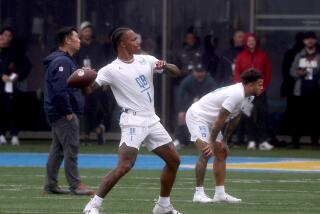‘Duck Dynasty’ star chose hunting over playing in the NFL
- Share via
“Duck Dynasty” star Phil Robertson seems a bit eccentric, but this may be plain old crazy.
Robertson reportedly turned down an offer to play for the Washington Redskins so he could pursue his hobby: hunting.
In the 1960s, Robertson played quarterback at Louisiana Tech. He apparently was good, so good that he started ahead of Terry Bradshaw, who went on to win four Super Bowl titles and was inducted into the Hall of Fame in 1989.
According to Sports Illustrated, the Redskins made Robertson an offer to turn pro during his junior year. But Robertson turned it down because he wanted to focus on duck hunting.
“Throwing a touchdown pass to a guy running down the sideline, and he runs down with the ball for six, it was fun,” Robertson told the magazine. “However, in my case, it was much more fun to be standing down in some flooded timber with about 35 or 40 mallard ducks comin’ down on top of me in the woods. That did my heart more good than all the football in the world.”
Robertson’s decision ended up paying off.
He is a multimillionaire with a master’s degree in education. He owns a business selling duck calls and other gear and stars on a reality show on A&E; called “Duck Dynasty,” which showcases him and his family.
According to the network’s website, “Duck Dynasty” is A&E;’s most-watched series.
“At the time, no one quite understood what exactly was my problem ... but what they didn’t see then, they get it now,” he said.
ALSO:
Injured NASCAR fans explore legal options
LeBron James claims that he’s faster than Manti Te’o
Mike Krzyzewski steps down as coach of U.S. men’s basketball team
More to Read
Go beyond the scoreboard
Get the latest on L.A.'s teams in the daily Sports Report newsletter.
You may occasionally receive promotional content from the Los Angeles Times.











